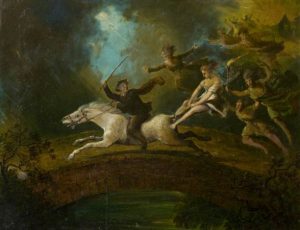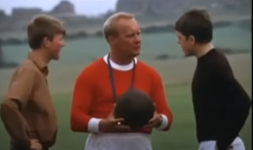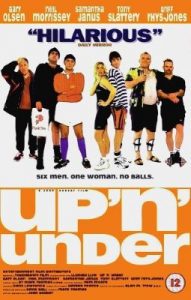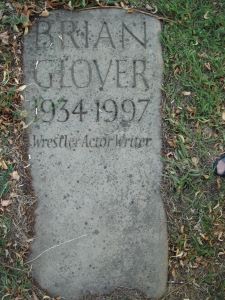
From wikipedia.org / © Ron Waller
This is a revised and expanded version of a piece I had published one January 25th in the Arts section of Concrete, the students’ newspaper at the University of East Anglia, where I did a Master’s Degree many years ago.
Tonight, whisky will be guzzled, haggis devoured, bagpipes blasted and Scots-language poetry recited with gusto at thousands of special suppers and get-togethers around the globe. This is because today, January 25th, is the 265th anniversary of the birth of Robert Burns, Scotland’s national bard and one of its most popular contributions to international culture.
Why, more than two-and-a-half centuries after he died at the age of 37, is Robert Burns such big deal? Here are some reasons.
One. Burns was a champion of the common man. Born in humble circumstances, as one of seven children to a farmer in Ayrshire, he was much more in tune with the ordinary masses than any of his literary contemporaries. The American poet Waldo Emerson described him as the poet of ‘the poor, anxious, cheerful, working humanity’. The fullest expression of his egalitarian instincts was the song A Man’s a Man for a’ That (1795), which was adopted as an anthem by the anti-slavery abolitionist movement. That, however, highlights an uncomfortable fact…
In 1786, Burns came within a hair’s breadth of travelling to Jamaica and taking up a job-offer as a bookkeeper on a sugar plantation – run on slave labour. Burns’ defenders argue that as a young man at the time, pre-fame, facing destitution, and desperate to get out of Scotland, he probably didn’t consider the hideous moral implications of the job he was about to undertake. Also, by 1792, he seemed aware enough of slavery’s horrors to pen The Slave’s Lament, which begins: “It was in sweet Senegal that my foes did me enthral / For the lands of Virginia-ginia, O.“ But the issue is murkier still, because Burns’ authorship of The Slave’s Lament has been disputed.
Anyhow, later, socialists claimed Burns as one of their own. A 1929 translation of his works into Russian sold a million copies and the Soviet Union honoured him with a commemorative stamp in 1954. However, Burns obviously had appeal for capitalists too, for there are allegedly more statues of him in North America than of any other writer.
Two. Burns was a songwriter too. Indeed, if anything, he is more pervasive as a songwriter than as a poet. In addition to A Man’s a Man…, he put Auld Lang Syne on paper in 1788 – which, by virtue of being belted out at New Year celebrations everywhere, is arguably the most universally-sung song in the world. In Japan it is played at everything from high school graduation ceremonies to evening closing-time in department stores.
Three. Burns wasn’t afraid to criticise the moral and religious mores of his time. His contempt for the censorious regime of Scotland’s Presbyterian Church was expressed most famously in Holy Willie’s Prayer (1785), wherein a supposedly pious pillar of the church prays to God and unwittingly reveals himself as a scheming, bitter, drunken hypocrite. Particularly pathetic are his pleas to be forgiven for his lechery, which has targeted ladies by the name of Meg (“And I’ll ne’er lift a lawless leg / Again upon her”) and ‘Leezie’s lass’ (“…that Friday I was fou / When I cam near her”). John Betjeman was so impressed by the conceit that he borrowed it for his 1940s poem In Westminster Abbey.
Four. Burns has a massive cult that keeps his memory alive. The first Burns societies began to congregate in his honour in about 1800, four years after his death. In 1859, the first centenary of his birth, almost 900 events were staged – 60 of them taking place outside Britain and the US. Today, Burns societies are to be found everywhere from Rio de Janeiro to Tokyo and from Winnipeg to Jakarta.
It’s claimed that the Russians have more such societies than even the Scots do. Well, in the unlikely of event of Vladimir Putin sticking his head into a Burns supper this evening, I hope he’s regaled with Burns’ 1792 rewrite of the song Ye Jacobites by Name, whose anti-war lyrics include: “What makes heroic strife? / To whet th’ assassin’s knife / Or hunt a parent’s life, wi’ bluidy war?”

From wikipedia.org / © Melissa Highton
Burns suppers on January 25th are marked by lusty recitals of his greatest poems, speeches and copious consumption of whisky and haggis. Praised as the ‘great chieftain o’ the puddin’ race’ in Burns’ Address to a Haggis (1786), haggis is surely the only offal-based foodstuff to have a piece of world-class literature written in its honour. No other writer is commemorated by a yearly celebration on this scale. Dublin’s James Joyce-themed Bloomsday on June 16th doesn’t come close.
Five. Burns invented the concept of the doomed, decadent romantic poet. Long before Byron and Shelley were painting the towns of Europe red and proving themselves mad, bad and dangerous to know, Burns had earned himself a mighty reputation for dissipation, both in the pub and in the bedchamber. His love of strong drink is obvious in poems like John Barleycorn (1782) while his promiscuity led to him siring at least a dozen children with at least four different women – a common jibe at the time was that you could see his face in every pram on Edinburgh’s Princes Street.
Six. Burns is controversial. And no doubt the arguments that have raged about him over the centuries have helped keep his fame alive. Much debate has centred on whether or not someone with Burns’ obvious character flaws deserves such veneration. At the beginning of 2009, just before the 250th anniversary of his birth, right-wing Scottish historian Michael Fry caused a storm when he denounced Burns as a ‘racist misogynist drunk’ who didn’t deserve to be presented to people as a role model. Fry sounded a bit like a rock-and-roll era parent expressing concern about the examples the likes of Jim Morrison, Sid Vicious, Liam Gallagher, Pete Docherty, Amy Winehouse, etc., set for young people.
Seven. Burns’ work has had a considerable influence on the English language and on English-language culture. Here are a few examples:
Proverbs:
- The best laid plans of mice and men will go astray (‘The best-laid schemes o’ mice an’ men gang aft agley’ / from 1785’s To a Mouse).
- To see ourselves as others see us (‘To see ousel’s as ithers see us’ / from 1786’s To a Louse).
- There is no such uncertainty as a sure thing (attributed to Burns).
Phrases:
- Man’s inhumanity to man (from 1784’s Man was Made to Mourn).
- Do or die (from 1793’s Bannockburn).
- Clean as a whistle (‘as toom’s a whissle’ / from 1786’s The Author’s Earnest Cry and Prayer).
- Time nor tide (from 1790’s epic Tam O’Shanter , wherein a drunkard stumbles across a Scottish witches’ sabbath in full swing).
- A parcel of rogues (from 1791’s A Parcel of Rogues in a Nation).
Burns-inspired titles:
- John Steinbeck’s novel, Of Mice and Men (1937).
- R. James’ short story, reckoned by some to be the greatest ghost story in English literature, O, Whistle and I’ll Come to you my Lad (1904) – which is also the title of a 1793 Burns poem.
- Ken Loach’s film, Ae Fond Kiss (2004) – which is also the title of a 1791 Burns song.
- The Vin Diesel car-chase / street-racing movie The Fast and the Furious (2001) – ‘fast and furious’ was a phrase Burns coined in Tam O’Shanter.
All right, with that that last example, the producers may not have been aware of the Robert Burns connection when they chose the title.

© National Trust for Scotland / Robert Burns Birthplace Museum







